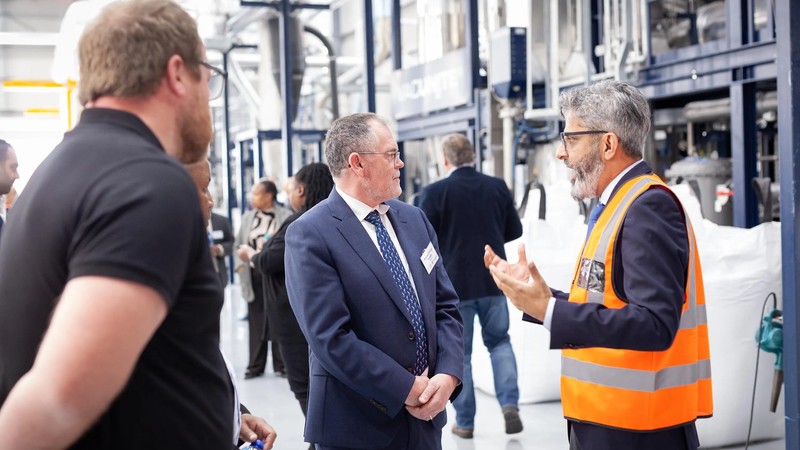Even as global talks on a plastic pollution treaty reached an impasse, South Africa continued to make headway in building a circular economy that transforms plastic waste into economic opportunity.
The launch of Extrupet’s new bottle-to-bottle recycling facility in Cape Town underscored the country’s commitment to sustainable production and innovation.
The facility, located at Extrupet’s Propet plant, became the first of its kind in the Western Cape and the company’s fourth in South Africa.
It officially began commercial production in March this year and is expected to add 15 000 tonnes of recycled PET plastic, or rPET, to the market annually.
Speaking at the launch, the Minister of Forestry, Fisheries and the Environment, Dr Dion George, said plastic pollution was not only an environmental crisis but also a public health emergency that harmed communities and threatened ecosystems.
“Through the Intergovernmental Negotiating Committee, we are advocating for a legally binding instrument that covers the full life cycle of plastics, from design and production through to consumption, reuse and disposal,” said Dr George.
Although negotiations on the global treaty had stalled, he said South Africa would continue to lead by example.
“This facility is more than bricks and machinery. It is a symbol of how South Africa can turn a crisis into an opportunity. It shows that with clear policy, vision and partnership, plastic waste can be transformed from a burden on our environment into a driver of jobs, innovation and inclusive growth.”
The Minister also highlighted the critical role that PET plays in the waste value chain, noting that when collected properly, it provides income for thousands of waste pickers and small businesses.
“If we collect PET properly, it supports livelihoods and builds enterprises. If we do not, it ends up in landfills, rivers and oceans. That is the choice before us, and this facility tilts the balance towards opportunity,” he said.
Extrupet’s joint managing director, Chandru Wadhwani, said the new plant marked the first phase of a two-step expansion that would double the company’s food-grade rPET output capacity.
“This line represents phase one, which takes our total output from 30 000 to 45 000 tonnes this year. Next year, we hope to launch phase two with new machinery that will see us producing 60 000 tonnes of rPET countrywide that meets international food-grade standards,” he said.
Wadhwani explained that PET, or polyethylene terephthalate, is one of the few plastics that can be fully and safely recycled into new food-grade products.
“With our increased rPET capacity, we will be able to process more plastic waste and strengthen South Africa’s position as a circular economy leader in Africa and the world. Our new plant can act as a beacon of hope in finding solutions to mitigate plastic pollution.”
He added that Extrupet had worked closely with the country’s producer responsibility organisation, Petco, for over two decades to balance the collection and recycling of PET while stimulating market demand for recycled products. Currently, around 70 percent of PET beverage bottles placed on the market by Petco members are being recycled.
Petco CEO Telly Chauke said the new Western Cape facility would strengthen regional recycling capacity and support local industries.
“Key infrastructure investments like this one ensure the availability of food-grade rPET at scale for local producers who must also meet increasing targets for including recycled content in their packaging,” she said.
Chauke noted that the facility would particularly benefit agricultural producers in the province, whose export punnets destined for the European market need to contain at least 25% certified rPET under new EU regulations.
“The economics need to work for recycling to succeed. Having facilities in key regions like the Western Cape will have a big impact, as it is costly to collect bottles locally and transport them across the country for reprocessing.”
She also encouraged consumers to play their part by choosing recyclable packaging and separating recyclables from household waste.
“Everyone has a role to play. Clean feedstock begins at home,” she said.
Despite the challenges at an international level, South Africa’s actions demonstrated that innovation, collaboration, and commitment could drive meaningful progress.
With investments like Extrupet’s latest facility, the country continued to show that the future of recycling was not just possible, it was already taking shape.
BUSINESS REPORT
